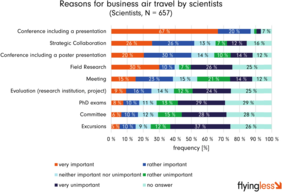Journal article in Nature portfolio "Climate Action"
This publication, entitled "An evidence-based approach to accelerate flight reduction in academia", is based on a unique database that was obtained through interviews and surveys at eight scientific institutions in Germany. At all participating institutions, greenhouse gas emissions from business air travel account for a significant proportion (between eleven and almost 50 %) of total emissions. When asked about the reasons for business travel, 87% of scientists stated that attending conferences with their own presentation was very important or important to them. The uneven distribution of flight activity is remarkable: professors and group leaders fly about four times as often as researchers without a scientific leadership function. According to the survey, around 70% of scientists would be willing to reduce their air travel by using virtual forms of exchange or other means of transportation more frequently. The group of students was also included in the survey: around three quarters of respondents have not yet taken a flight in the context of their studies; a similar number of students demand that study-related travel should be increasingly shifted to trains and buses and would prefer to work for an employer that is committed to reducing air travel in the future.
Travel to conferences, project meetings and field work are central elements of the culture of research and teaching. The reputation of academic institutions and the careers of researchers are closely linked to international networking - and therefore often to air travel. This is in contrast to the measures required to quickly and drastically reduce greenhouse gas emissions to net zero in light of the climate crisis. Universities and non-university research institutions have a great responsibility and role model function in this regard, especially when it comes to demonstrating that and how the scientific consensus on man-made climate change can be translated into concrete action in climate protection.
Provision of the FlyingLess Toolbox as a practice-oriented tool
As part of the "FlyingLess" project funded by the National Climate Initiative (NKI) of the Federal Ministry for Economic Affairs and Climate Protection (BMWK), the focus is therefore not only on recording the current situation, but in particular on developing and providing practice-oriented tools that institutions can use to successfully plan, implement and permanently anchor projects to reduce air travel. "Based on the current literature, my many years of experience with the topic of air travel reduction at ETH Zurich and our interviews and surveys in 'FlyingLess', we have developed a comprehensive and freely available toolbox, which we also present in the publication," explains Susann Görlinger, first author of the article and "FlyingLess" project manager at ifeu. The toolbox has a modular structure so that the institutions can select the parts that best support them in the respective phase of their project. The portfolio of content on offer ranges from scientifically sound background information on the topic to specific methodological tips for implementation. The central element is a checklist that helps to classify previous work and tackle the next steps.
Transformation of the scientific community as a door opener
In order to alleviate the dilemma between climate protection and internationalization, a transformation of the internal and external framework conditions in the scientific community is required. The commitment of role models and initiatives in the institutions themselves as well as the integration of sustainability and climate protection goals into the logic of research funding are of great importance here. "In our project, we rely on a transdisciplinary approach, which means that we closely incorporate the perspectives and expertise of the various status groups from research, teaching and management level into our work," emphasizes joint partner Nicole Aeschbach, Head of the TdLab Geography at Heidelberg University and researcher at the Heidelberg School of Education. The results obtained and tools provided in the "FlyingLess" project contribute to combining successful research with climate protection and are transferable to other sectors.
Original article:
Susann Görlinger, Caroline Merrem, Maximilian Jungmann and Nicole Aeschbach. An evidence-based approach to accelerate flight reduction in academia. npj Climate Action 2, 41 (2023). https://doi.org/10.1038/s44168-023-00069-y
